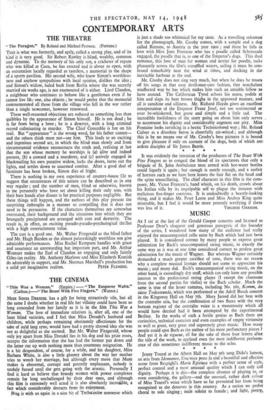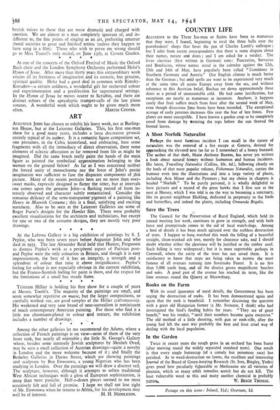MUSIC
As I sat at the last of the Gerald Cooper concerts and listened to Professor Dent's eloquent and generous panegyric of the founder of the series, I wondered how many of the audience had really enjoyed the unaccompanied cello suite by Bach which had just been played. It is considered correct by many people to express great admiration for Bach's unaccompanied string music, in exactly the same way as it was at one time considered correct to profess great admiration for the music of Wagner. But whereas Wagner certainly demanded a much greater sacrifice of time, there was no reason why a complete musical layman should not come to appreciate his music ; and many did. Bach's unaccompanied string music, on the other hand, is exceedingly dry stuff; which can only have any possible interest to the professional string player (I except the chaconne from the second partita for violin) or the Bach scholar. Much the same is true of the lesser cantatas, including No. 16r, Komm, du siisse Todesstunde, which was performed at the Adolf Busch concert in the Kingsway Hall on May 7th. Mary Jarred did her best with the contralto aria, but the combination of two flutes with the very bottom register of the contralto voice is a monstrosity which all would have decried had it been attempted by the experimental Berlioz. In the works of such a fertile genius as Bach there are curiosities, technical exercises and even examples of empty virtuosity as well as great, very great and supremely great music. How many people could spot Bach as the author of his more perfunctory pieces ? And yet it is de rigueur, all for the sake of those four letters after the title of the work, to applaud even the most indifferent perform- ance of this sometimes indifferent music to the echo. * * * *
Jenny Tourel at the Albert Hall on May 9th sang Dido's lament, an aria from Idomeneo, Una voce poco fa and a beautiful and effective scene from Respighi's Maria Egiziaca with a perfect sense of style, perfect control and a most unusual quality which I can only call dignity. Perhaps it is this—the complete absence of playing to, or even considering, the gallery—and the unusual, rather dark colour of Miss Tourel's voice which have so far prevented her from being recognised as she deserves in this country. As a nation we prefer choral to solo singing ; male soloist to female ; and light, pretty, boyish voices to those that are more dramatic and charged with emotion. We are almost to a man completely ignorant of, and in- different to, the fine points of singing as an art, preferring amateur choral societies to great and finished artists (unless they happen' to have sung in a film). Those who wish to prove me wrong should go to Miss Tourel's only recital, on June 13th, at Covent Garden.
* * * *
At one of the concerts of the Oxford Festival of Music the Oxford Bach choir and the London Symphony Orchestra performed Hoist's Hymn of Jesus. After more than thirty years this extraordinary work retains all its freshness of imagination and its esoteric, but genuine, spiritual quality. .Hoist had a good deal in common with Rimsky- Korsakov—a certain coldness, a wonderful gift for orchestral colour and experimentation and a predilection for supernatural settings. In the Hymn of Jesus he moves nearer to Scriabin, and there are distinct echoes of the apocalyptic trumpet-calls of the late piano sonatas. A wonderful work which ought to be given much more































 Previous page
Previous page